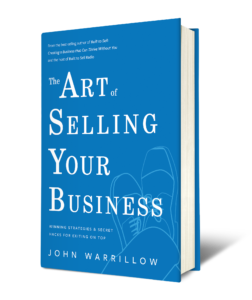1. Not knowing what the business should sell for
One of the most costly errors a business owner can make is not knowing the approximate price of his or her business prior to entering the selling process. Although the marketplace ultimately determines the final price, an owner needs to know what the approximate price his or her business is prior to placing the business on the market. Before making the decision to sell, owners should work with someone qualified to place a price on their company.
An experienced business broker has both the technical ability and the market experience to produce the most realistic pricing opinion. The business broker will also be the only alternative for supporting his or her opinion by selling the business.
Fair Market Value
Asking Price is what the seller wants
Selling Price is what the seller gets
Fair Market Value is the highest price the buyer is willing to pay and the lowest price the seller is willing to accept.
2. Not preparing the business for sale
Determining the starting price point is only the first step. Prior to exposing the business to the marketplace, preparation is necessary. A business is certainly not a house, but the same attention to appearance prior to sale is necessary. Financial and legal affairs should be current. Anything a potential purchaser might want to see should be up-to-date, accurate and available for review.
Momentum is very important in business transactions and can make or break a deal. The constant need to develop information for a serious prospect will destroy momentum and with it, possibly, the deal. Demonstrating preparedness places the business in a favorable light and prospective buyers will feel comfortable that everything is in order. Being unprepared can delay a closing, create costly expenditures to play catch-up, and cause prospective purchasers to lose confidence in the deal itself. Too much time almost always works against the deal happening.
3. Not being able to see their business through the eyes of a buyer
This can be very difficult for any seller. It is only natural to see one’s own business in a most favorable light and overlook the blemishes or problems inherent in any business. Sellers have to approach their business realistically, knowing that a potential buyer will be doing the same. By recognizing the deficiencies of their business, sellers are in a much better position to deal with the concerns of the buyer. In fact, the best way to handle any potential problem areas is to bring them up in the very beginning.
4. Not really knowing the buyer
The better you know the buyer, the smoother the transaction. By knowing the buyers, their motives, their interests and their backgrounds, the better equipped a seller is to make informed decisions about whether they are the right people to operate the business. When final negotiations begin, knowing the buyers can help resolve some of the issues that will arise. Are their interests the same as yours? If you, as the seller, are financing the deal, do you feel confident that they can make the payments? The more you know about why a buyer wants to buy your business, the better position you are in to know when to be firm in the negotiations and when to be flexible.
5. Trying to sell the company to a buyer who doesn’t want to buy
There are usually many more potential buyers than there are businesses for sale. The question is — how serious are they? A buyer may indicate a great deal of interest but when it gets down to the wire, he or she may back out of the deal. Some buyers want to buy only on their terms and conditions, some may have too many decision-makers to please, and others only want to buy the “perfect” business. Wasting time on those who aren’t serious about purchasing a business takes away valuable time from those buyers who really want to buy.
6. Being your own worst enemy
Many business owners feel that no one knows their business like they do. They think they can do a deal by themselves. They don’t need, or want, any help. They think they are lawyers, accountants, business brokers and outside advisors all rolled up into one person. Then when the going gets tough, they become impatient and inflexible. They then blame others, usually the buyer, when the deal blows up. As the old saying goes: “The attorney who represents himself has a fool for a client.” The same could be said for the business owner who thinks he can sell his or her own business. Not using outside advisors, such as a professional business broker, is a serious mistake.
7. Not understanding the structure of the deal
Regardless of the size of the deal this could be the scenario: an offer is presented, the seller takes one look at the price, immediately says “no” and refuses to look any further. The price, within reason, is immaterial. The real crux of the deal is how it is structured. Consider the negotiating axiom “You can name the price if I can name the terms.” The terms and conditions are important. A seller may be ecstatic about price only to find that the devil is in the details.
8. Not being able to walk away from the deal
Too many sellers get so involved in trying to put a deal together that they don’t see the big picture. They don’t realize that the deal isn’t a good one. In other words, it’s time to walk away from the deal and go on to the next one. Many sellers don’t want to let the deal get away. Since they have invested a lot of time and effort, and probably expenses, it’s often difficult to just end it. However, in some cases that’s exactly what must be done. If the deal isn’t right, and can’t be fixed, there is no other choice. It’s much better not to do the deal than to do a bad one!
9. Waiting too long to sell
Too many owners wait until the last minute to decide to sell their business. They wait until business is down, or they are completely burned-out, or their business partnership has soured completely. The time to sell is before the emergency happens. The time to sell is when business is good. The time to sell is prior to when exasperation hits. The old adage is that a business owner should think about and plan the eventual sale of the business the day after it is started or purchased.
10. Changing your mind
The sale is progressing nicely, the buyer is happy and the seller well, the seller is contemplating life without the business. He or she realizes that when the business is gone, they will have nothing to do. The business has been a major part of their life for many years. Just before the closing, the seller decides that he or she can’t live without the business and the deal starts to unravel. Sometimes, seller’s remorse arises because a business acquaintance says the price was too low, or there isn’t enough cash involved or offers some other uninformed reason. If it was a good deal in the beginning, don’t let well-meaning outsiders influence the sale. And, if there is even a speck of doubt about selling the business, don’t begin the process. Wait until there is not one shred of doubt.
Copyright: Business Brokerage Press, Inc.
dlkushin/BigStock.com




























































